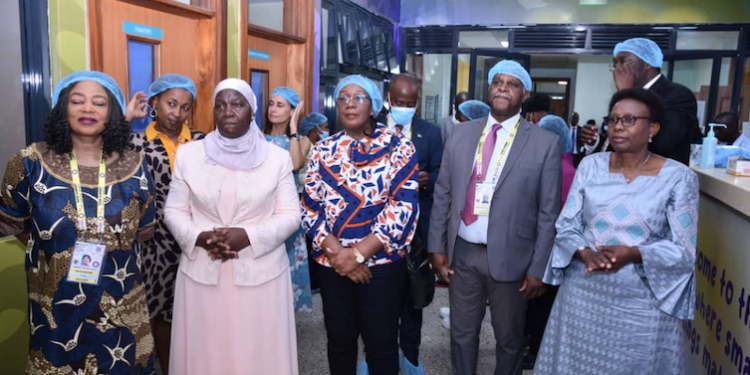By THE OBSERVER UG
The minister for Health, Dr Jane Ruth Aceng (R), with the guests and government officials inside the Neonatal unit of the facility
First lady, also minister of Education and Sports, Janet Kataha Museveni has told visiting spouses of heads of state and governments that Uganda intends to construct at districts several state-of-the-art hospitals at the level of Mulago Specialized Women and Neonatal Hospital (MSWNH).
As part of the sideline activities for the just concluded Non-Aligned Movement (NAM) summit, the spouses were on Saturday invited by Ms Museveni, to share Uganda’s maternal and newborn health journey as well as tour the facility that was constructed with a loan from the Islamic Development Bank (IDB).
Mignon Bowen Philips, the spouse to the prime minister of Guyana, and Desire Mpfubusa, a technical advisor to the first lady of Burundi. The first lady of Equatorial Guinea was represented by; Justino Obama and Josefa Nsa – the country’s vice minister of Health and director of Health Representative at Quanalupe Clinic, respectively.
In a speech read by the minister of Health, Dr Jane Ruth Aceng, Ms Museveni said the government plans to replicate the MSWNH facility at district level, and to a great extent, even the lower levels of health access in the country.
This, she said, will include increasing the number and capacity of health workers through district-led training, support supervision, and mentorship while at the same time ensuring that health facilities are well-stocked to deliver adequate services to the people.
“The facility has enabled us to market the remarkable reduced maternal health mortality rate from 336 [five years ago] to 189 per every 100,000 live births – according to the 2022 Uganda Demographic Survey. We have plans to reduce it even further so that we can prevent mothers from dying during childbirth and pregnancy,” Aceng quoted Ms Museveni as saying in her written speech.
She also emphasized the role of motivating health workers to give excellent maternal and newborn care.
“When workers are motivated, it is even possible to find local solutions to ensure the sustainability of improved medical facilities. This is why we are trying to remove the health system bottlenecks at all levels because they lead to low coverage of many priority interventions and household resistance to recommended practices,” Ms Museveni said.
Aceng said the salaries of health workers were enhanced recently, and “this will continue as the revenue base increases.”
Meanwhile, MSWNH executive director Dr Evelyn Nabunya urged the government to effectively address its staffing needs to aid the delivery of high-quality healthcare services. Nabunya said the hospital is a beacon of hope for women’s reproductive health in the country and region, thus the need for enhanced staffing needs to address the ever-growing workload.
“We have excellent equipment and medical supplies but our major challenge is human resources in the various departments of the hospital. We are quite low at 36.6 per cent,” Nabunya said.

She added: “In offering highly-specialized services, we are few and this brings burnouts among staff and delay in care. Our patients may also go out unsatisfied but we are working on that. We are seeing a wage increment but we are waiting to see that the government looks into our human resource to the required standards.”
Despite the staff shortfalls, Nabunya noted that the hospital looks at every woman wholesomely, offering the best maternity care and managing complications that could arise during pregnancy and childbirth.
“We care for babies with complications including those born preterm, some weighing as low as 500 grams. This has brought smiles to thousands of families,” she said, revealing that the hospital is currently taking care of a five-week-old preterm baby with 480 grams – whose growth will become a new “medical miracle” at MSWNH.
SPECIALISED SERVICES
Nabunya told guests that the hospital has a clinic dedicated to adolescent girls, to help them cope with reproductive health challenges. For couples struggling to get babies, the hospital provides assisted reproductive technologies (ART), including In Vitro Fertilization (IVF) services which has changed the narrative in some women’s lives.
MSWNH also carries out reconstructive surgeries in women to correct mishaps caused by complications/injuries during childbirth to enable women to lead a stigma-free life.
“For senior women in menopause, we have a clinic that is dedicated to addressing their well-being, offering to counsel, and management of the menopause-related challenges,” Nabunya said.
She added that the hospital is also dedicated to cutting-edge innovations through research and teaching; producing highly skilled specialists who diligently serve the nation with expertise. With all the specialized care at the public facility, services come at a cost. When asked about the hefty prices that come with this special care, Nabunya had this to say.
“Our prices are very much subsidized. However, for women who are referred to us from other facilities, provision is made for them to access the much-needed care whether they have paid or not. Our prices are friendly compared to private facilities in the country and region.”







Discussion about this post